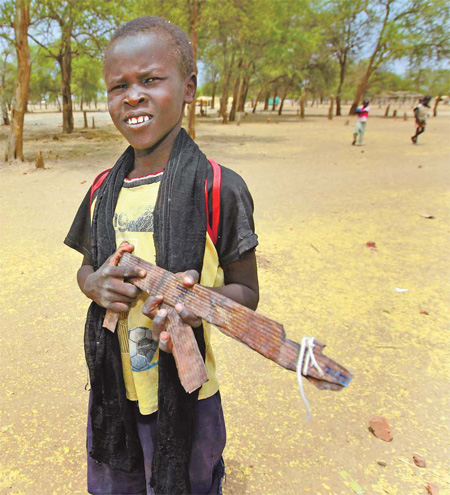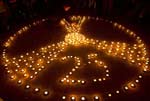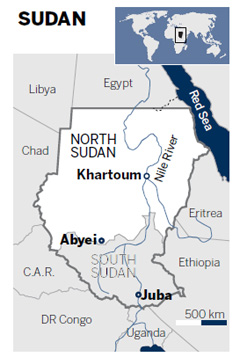Politics
Fear on the horizon at dawn of a nation
Updated: 2011-04-21 08:42
By Zhang Haizhou (China Daily)
Conflict and bitter rivalries plague the emergence of a country seeking a future, reports Zhang Haizhou in Abyei, Sudan.
Editor's note: With the birth of Africa's newest country only months away, China Daily reporter Zhang Haizhou and photographer Cui Meng visited the disputed Sudanese border region of Abyei to look at the causes of a bitter ethnic dispute that is likely to drag on after south Sudan declares independence on July 9.
The temperature remained stubbornly at 40 C although March and April were supposed to be the rainy season.
To avoid the blistering heat, a group of young men from the Ngok-Dinka ethnic group were sitting in a wooden shack on Abyei's main street.
 |
|
A boy holds a wooden gun at a refugee shelter in Abyei, Sudan, on March 23, a potent symbol of a possibly volatile future. [Photo/China Daily] |
As most of them were chatting, one of them was quietly doing some needlework. He was carefully sewing a piece of white cloth, making a satchel.
But this was no ordinary satchel.
"It's to carry ammunition," another man chipped in, stuffing one of the pockets with a fully loaded rifle clip to show how it works.
|
||||
The five-decade civil war between southern Sudan, led by the Sudanese People's Liberation Movement (SPLM), and the central government in the north ended in early 2005 when the Comprehensive Peace Agreement was signed.
But the conflict continued in Abyei between the Misseriyas, a nomadic Arabic tribe, and the Ngok-Dinka.
The south is due to secede on July 9 after 99 percent of its voters backed independence in a January referendum. But a promised ballot for Abyei's residents to decide whether to join the south or north was postponed indefinitely, with the ruling parties in Khartoum and Juba, the southern capital, at loggerheads over whether the Misseriyas were eligible to participate.
The heavily armed cattle-herding tribe was a key proxy militia of Khartoum's army in the 1983-2005 second Sudanese civil war with the SPLM.
They traditionally move their animals through the fertile Abyei district each year, to access water and graze land farmed by the Ngok-Dinka, their bitter wartime enemies who support the south.
What makes the dispute even worse is that many believe the region is rich in oil reserves.
"Abyei may be a powder keg for north and south Sudan in the future," said Li Xinfeng from the Chinese Academy of Social Sciences.
Around 200 people have died so far in the conflict in 2011, according to Kon Manyiet, minister of physical infrastructure and public utilities.
A recent clash took place in the early hours of March 21 in a village about 20 km to the north of Abyei town, controlled by the Ngok-Dinka.
The villagers said the Misseriyas raided their village, killing at least five people.
Middle-aged Ayiik Arop was displaced by the clash. Two days later, he was in a truck with many of his neighbors, who were carrying nothing more than a few pieces of furniture, some crockery and food.
"It was about 2 am and we were woken by gunshots. Five people were killed instantly and another injured," Arop said as he recalled the horrific scene.
He said the villagers resisted for a while, but as the fighting continued, they decided to let the more vulnerable leave. Guarded by a few young men and led by Arop, the truck, carrying mostly elderly people, women and children, left the village.
Their destination was Agok, a village in the region, about 40 km south of Abyei town. It has now become a safe haven for tens of thousands of displaced Ngok-Dinka.
"We wonder who offered the Misseriyas weapons," Arop said, adding that many young men stayed in his village "to defend our land".
A leading Misseriya, Mohammad Omar Ansari, described the situation as catastrophic, accusing the Ngok-Dinkas of denying his tribe access to sources of water by force and mobilizing fighters.
Ansari claimed that the SPLM had already killed 11 Misseriya children, abducted seven and torched 11 vehicles within the past few days. He stressed that the Arab tribe would defend its wealth, the Sudan Tribune reported recently.
E-paper

Image maker
French art curator helps organize one of China's biggest photography events.
Preview of the coming issue
Reaching out
Fast growth fuels rise in super rich
Specials

25 years after Chernobyl
Belarus, Ukraine and Russia will mark the 25th anniversary of the nuclear reactor explosion in Chernobyl.

Luxury car show
The world's most prestigious luxury, sports cars and supercars are displayed in Monaco.

Peking Opera revival
Traditional opera is enjoying a revival in Beijing thanks to some modern touches.





